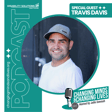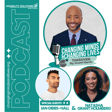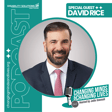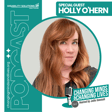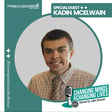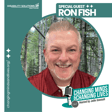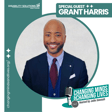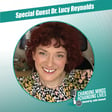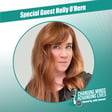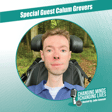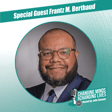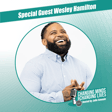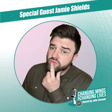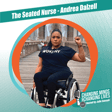Become a Creator today!Start creating today - Share your story with the world!
Start for free
00:00:00
00:00:01

A chat with Erin McCann of Roche Diagnostics
Julie sits down for a chat with Roche Diagnostics' EEOC Manager, Erin McCann, to discuss self-identification, what to look for in an inclusive employer, remote work, and more.
Transcript
Introduction to the Podcast and Mission
00:00:00
Speaker
All right, welcome to the Changing Minds and Changing Lives podcast. My name is Julie Sowash and I'm the Executive Director of Disability Solutions. We decided to start this pod because we want to share so much of what is happening in the disability community with you, our listeners, our customers, our friends, our supporters and allies, and to help spread our mission to change minds and change lives through true and meaningful disability and inclusion. And if you don't know about Disability Solutions,
00:00:30
Speaker
I'll take 30 seconds and tell you. We're a US-based nonprofit working with companies around the world to help build strategy, brand, all things talent acquisition to get our community to work with employers who value the talent that we bring to the workforce.
Interview with Erin McCann Begins
00:00:45
Speaker
Today, I'm excited to share our first podcast with a very special guest and friend of Disability Solutions, Erin McCann, who is the EEO Compliance Manager at Roche Diagnostics. Welcome to the podcast, Erin.
00:00:59
Speaker
Thank you. Thank you so much for having me. Yeah, we're thrilled to have you. So tell us about why you decided to join Roche and then also why you decided to become a part of the disability employee resource group there. Yes, great question. So Roche has always had a really global impact. And when I was looking and just job searching, looking at Roche and
00:01:29
Speaker
The legal entity that I work for under Roche is tissue diagnostics. And one of their huge tests that goes out there is the cancer test that you first get. It's that pink and purple dye test that everybody sees. And the way that they help individuals get diagnosis is really kind of maybe that plan of care has always been a huge impact for me. I've seen that test firsthand with my dad, with other family members.
00:01:58
Speaker
That connection of doing what the patient needs next is really something that's always hit home with me. And then with our employees resource group, I was so excited when we got to start the abilities resource group. It's really employee driven and that's so important because it's employees helping other employees really understand and navigate some of the items of having a disability.
00:02:24
Speaker
And it could be caregivers. It could be you have a family or friends. You could be just an advocate.
Affirmative Action and Self-Disclosure
00:02:31
Speaker
So it's so important to be in that group and make sure that they have an impact and that they're reaching out to everybody in the community that they can to share all of the wonderful things, but also the benefits and drive any additional benefits that we might need within the workspace. That's really a place for employees with disabilities to connect with each other.
00:02:53
Speaker
find supports and help drive the messaging on what they need as a community, as a talent workforce within Roche so that they can communicate that with your leadership. Is that fair? Very fair, yeah. I mean, I think about we didn't have ABA therapy years and years ago. And really, one of the things that drove it was we had an employee who shared their story and shared it out broadly. And that drove that benefit.
00:03:23
Speaker
15, I think 15 plus years ago. And so just making sure that we have those benefits for our employees or, you know, there are people that really matter in their life is something that is heavily important. I think that benefit goes back and forth. Absolutely. So your title is Equal Opportunity Compliance Manager.
00:03:46
Speaker
And you and I were chatting before we started and you know, I'm a compliance geek. You're a compliance geek. We are very passionate about this. But I think a lot of times people in underrepresented communities, including people with disabilities, don't understand what affirmative action is. And for us in particular, as people with disabilities and employees with disabilities,
00:04:11
Speaker
to know whether they should check that box that says, yes, I am a person with a disability. Is there information safe? Why does it matter to Roche that they check that box? I would love for you to just spend a few minutes sort of debunking some myths that we have around that check the box activity and tell us why it's important to Roche. Yeah, that's such a great question. And so affirmative action has really been that hot topic.
00:04:39
Speaker
But really it's contextually so different in that employment space. And it's about equity within our workplace, making sure there are no barriers. Are we getting those individuals in that have great
Understanding Self-Disclosure
00:04:51
Speaker
talent? Now, everybody does the job different. And that's why there's different abilities throughout all of the organization. So we look at it from that lens of equality, but really checking that box is vitally important for us.
00:05:07
Speaker
it's not going to be shared with managers. And that's something I wish employees really knew more is we don't share their information. We use it to make sure, again, there's equity within that processes. Do we have any barriers to anything? And we can check that through those self-disclosures. And that's really what it is. It's self-disclosing to the company and checking that box in that workspace versus self-disclosing
00:05:35
Speaker
externally yourself because your employer will never self disclose for you. And it actually doesn't start any processes. And I think that's another big misconception is if I check this box, my employer knows and they're going to think I need something additional. And that's not the case. We just want to know where again, our processes sit. If you need something additional, that's we will work through that process, gradually, gladly, because we want everybody to have what they need to do that work. And they need it differently. But
00:06:05
Speaker
You know, we just want to make sure we're serving all of those communities too and bringing in those great talents. And I think that's just so beautifully put. And another thing that I always say is, you know, there's power in numbers. And so when a leadership of a company can see, you know what, we have a good size chunk of our employment or our employees that have disabilities. We need to be thinking about
00:06:31
Speaker
How do we better serve them, grow their talent, make sure that they are able to stay with Roshan and be their most productive selves? And so I appreciate that because I do want people to feel comfortable checking that box. Very different from self-disclosure, which is when you tell your manager, hey, I'm a person who lives with a disability. So thank you for sharing that. I appreciate that. I think we'll talk about that a lot on this podcast, just making sure we're debunking some of those pieces.
00:07:02
Speaker
And that is really what you do as a compliance leader is you make sure that employees with disabilities have their voices heard and make sure that they're counted and that's incredible. So what are some of the things that you've learned that people without disabilities still have misconceptions about our community?
Challenging Misconceptions and Biases
00:07:26
Speaker
Yeah, I'm gonna have to say, I think one of the biggest ones is that they need something else. And I always bring this up is they have an idea of what a disability is and everybody knows kind of that universal symbol, but it goes so much beyond that. 80% of disabilities are hidden. So you could look at somebody and have no idea. And that's really about it is hopefully debunking that they need something additional
00:07:53
Speaker
And maybe they do, but everybody does. Everybody does their job differently because they have different abilities in how they do stuff. Somebody could be really into math. Somebody could be really into science. They could need two totally different stuff, but come up with the same concept or a little different, and it's only going to make things better.
00:08:15
Speaker
Yeah, I think that's a great point. And, you know, most people who have disabilities don't need accommodations and accommodations when they are needed are generally fairly low cost. But the other point that you made that I think is so relevant here is that we all have our own biases and there's nothing wrong with having a bias. We just need to acknowledge it and then start to take action to overcome that bias. And so when a person without a disability or even a different type of disability
00:08:45
Speaker
encounter someone with mental illness like I live with. They have what they've seen in the media, what they've seen and grew up with in their life. They have a preconception about who I am. And when we're having those conversations, we're able to start to get rid of some of those preconceptions and move past them. But that's one of the really big things that we need to understand, I think, as people
00:09:15
Speaker
humans is that people with disabilities are not scary. It's not shameful. We don't need pity. We just want the opportunity to come and live and work and have, in this case, the American dream, just like everyone else does. And so I think that's a great point that you make.
Living with Hidden Disabilities
00:09:36
Speaker
You know, and you and I talked a little bit before you came on and
00:09:42
Speaker
and you let me know that you're a person that lives with hidden disabilities. Thank you for sharing that with me and that disclosure. And what are some of the challenges that you overcame, whether it was when you were looking for a job or while you've been an employee or even during the new hire process that you had to overcome as a person with a disability in that job seeker role? Yeah, I think for me,
00:10:12
Speaker
It's kind of a very unique space because I am very aware of the processes, just being in compliance. I'm aware of the interactive process when someone does need an accommodation. I'm aware that employers aren't going to be using my information and hiring managers aren't going to see that and it's not going to go through that decision. So it was really easy for me to always check those boxes because of that.
00:10:38
Speaker
I think the hardest thing is I had seen my father go through having a disability and it coming on while he was already employed and some of those negative things that happened there. And so even though I knew of all of these processes of knowing my employer is not going to know, it's still just a little scary always checking that box. And so kind of having that internal gut check of, yeah, I can check that box and be okay, still gets me, you know?
00:11:08
Speaker
It is, but it's still, am I going to be okay? Um, I think that's probably the biggest piece still is you're internally always going to be nervous, but knowing it's okay. Okay. And knowing that those employers want to do the right thing. Again, I'm even using that to make sure we have those equity, but it's still, you still have that moment hesitation. And so that's probably the biggest, um, hurdle I overcame in knowing all employers.
00:11:36
Speaker
aren't going to have those negative kind of stories that my father overcame with his employer. So that, and again, I think that maybe even drove me more into the Himalayan space because knowing that I could stop those stories and help make sure that those aren't happening has always been big. Oh, that's just a really incredible story.
00:11:59
Speaker
and very unique to anything that I've ever heard because you had an experience, you know, with someone that you love, you know, and who was going through something very scary and then also didn't have an employer who supported them. And then to overcome that fear is really important. And I mean, I think that also goes to one of the things that we need to do as leaders within HRRTA compliance is sort of demystify
00:12:28
Speaker
the apply process, demystify the self-identification process and why it's important. And know that because one company made a mistake or one manager made a mistake doesn't mean that that is the case for every manager, every company. And I'm so happy because it feels like in the last two or three years we've come so much further
00:12:56
Speaker
in disability and inclusion around employment. I mean, if you would have asked me 10 years ago, would you and I be sitting here having this conversation where we're both professionals, leaders, talking about our disabilities, talking about our journeys, and that people would be excited to hear that. I would not have believed it. And so thank you again for sharing that. That's such an incredible story.
Advice for Job Seekers with Disabilities
00:13:24
Speaker
And so kind of in that vein, as someone who can see behind the curtain, what would be your best advice for a job seeker out there today who has a hidden disability like ours in terms of what they should be looking for from an employer when they're deciding, do they want to join Roche? Is this the place for me? What are some of those kind of tips or tricks that you would give them to say, hey, you know what, this company is actually thinking about me.
00:13:54
Speaker
Yeah, I mean, there's so many good ones. And for me, it is kind of looking at that environment within the company. When we look at it, we know that disability doesn't affect one job. It doesn't affect one level of employee. It doesn't affect, you know, it's falls throughout, you know, the C-suite all the way down to everybody. Like, it affects everybody within the workspace.
00:14:19
Speaker
So there's not gonna be a glass ceiling for you. And you should look for an employer that knows that. And what are they doing to really make a difference? Does it hit home for you? Because working where I do, I feel a passion every day coming in. And hopefully you can also, making that impact wherever you want. And again, it's just knowing that they have maybe great benefits. Looking at all of those things, but I think the biggest one for me would be
00:14:50
Speaker
ensuring that they have this equitable process. Now, most employers want to get there and we want to know these different viewpoints, these different advantages, because it's only going to make us better. That's what I would look for an employer. I think that's really great. We want to look for some of those external hints that this is a company that's at least starting to think about me. And I think, you know, make a really good point that every company is on a journey and every company is in a different place.
00:15:19
Speaker
And that's okay. And we want to look for companies that maybe are at the top, but there is so much great work that's happening, companies around the world. I really feel like this is such a high point for us as a community. So thank you again for that. So two more questions before we wrap it up.
Remote Work Benefits for People with Disabilities
00:15:41
Speaker
So one other thing that we were chatting about is that you're also a remote worker.
00:15:45
Speaker
as I am a remote worker, I've been remote for the last 13-ish years. And for me, being remote is something that is very helpful in terms of managing my disability, managing some of the things that I go through as a person who lives with mental illness, and has helped me to be a more productive, more happy employee. And I feel like it's helped to drive a lot of my success.
00:16:14
Speaker
Tell us what it means to you in terms of being able to be remote and why that's important that Roche has offered you that opportunity to work and live where you need to. Yeah, so for me, I've been remote the whole time I've been with Roche and so never really. I go into an office and I've always joked even pre pandemic I go into the office one to two weeks out of the year, just depending on where I'm needed.
00:16:42
Speaker
But it really allows me to broadly look over the company, but also make sure that I'm consistently having the same job. Now, I do my job the same that I would if I was in a workspace. But they've really noticed that, and I think a lot of employers have taken notice, especially with the pandemic happening, that you can get just as much work done where you're at.
00:17:06
Speaker
and you're going to keep consistent employers. You're going to have them longer. The retention is going to be better when you allow them that flexibility somewhat that they need. And so for me, it's making sure that also I'm there for my family too. Yeah, absolutely. It meets multiple boxes for you. It's not just about having a disability. It's about being a mom. It's about being a wife. Thanks for sharing that.
Erin's Favorite Concert Experience
00:17:29
Speaker
So last question, silly question. First or favorite concert ever?
00:17:36
Speaker
Oh man, so I don't even know if I remember my favorite concert, but probably there's two that are so good. So I love Tim McGraw. He is amazing. Emotionally though, he always gets me. So like, those are a different type of concert for me, but probably favorite recently has been Kiss. That one was pretty good and hard to top. Okay, that's a good one.
00:18:05
Speaker
both very, very good ones. Awesome. Well, thank you, Erin, so much for joining us on the Changing Minds and Changing Lives podcast. Thank you for your partnership with Disability Solutions and all that you do for our community, not just through your work, but through your engagement with the employee resource group as well. Thank you, everyone. We'll see you next time.
